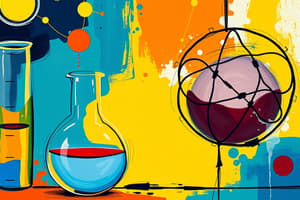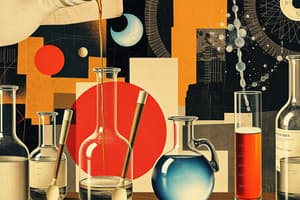Podcast
Questions and Answers
What is condensation?
What is condensation?
The process of turning a gas into a liquid.
Explain the difference between physical changes and chemical changes.
Explain the difference between physical changes and chemical changes.
Physical changes are reversible and no new substance is created, while chemical changes are irreversible and result in a new substance.
What are the signs that indicate a new substance is created?
What are the signs that indicate a new substance is created?
Change of color, change of temperature, and the production of a gas (bubbles or a smell).
Define solvent, solute, and solution in the context of dissolving sugar in water.
Define solvent, solute, and solution in the context of dissolving sugar in water.
How does temperature affect the dissolving of sugar in water?
How does temperature affect the dissolving of sugar in water?
Why are chemical changes always irreversible?
Why are chemical changes always irreversible?
Explain the particle behavior in solids according to the particle model.
Explain the particle behavior in solids according to the particle model.
What is the process of turning a liquid into a gas over a period of time?
What is the process of turning a liquid into a gas over a period of time?
Define the melting point of a substance.
Define the melting point of a substance.
Explain the behavior of particles in gases according to the particle model.
Explain the behavior of particles in gases according to the particle model.
What is the temperature at which a liquid turns into a gas?
What is the temperature at which a liquid turns into a gas?
Differentiate between evaporation and condensation.
Differentiate between evaporation and condensation.
Flashcards are hidden until you start studying
Study Notes
Physical Changes
- Condensation: turning a gas into a liquid, occurs slowly over time
- Reversible physical changes: changes between states, no changes in substance, particles get closer or farther apart due to temperature change
- Signs of a new substance being created: change of color, change of temperature, gas formation (bubbles or smell), these changes are chemical and irreversible
Temperature and Dissolving
- Dissolving sugar in water: water is the solvent, sugar is the solute, and the solution is formed
- Sugar particles are surrounded by water particles until they seem to disappear
- Higher temperature increases the rate of sugar dissolving in water
Chemical Reactions
- Chemical changes are always irreversible, creating a new substance
- Reactant + reactant = product
- Examples: vinegar + baking soda, iron + oxygen, resulting in rust and bubbles (a gas)
Scientific Enquiry
- Doing research: observing changes over time, looking for patterns, identifying and classifying
- Planning and carrying out a fair test
States of Matter
- Solids: fixed shape, almost impossible to compress
- Liquids: no fixed shape, flow, take shape of container, almost impossible to compress
- Gases: no fixed shape, flow, expand to fill space, easily compressed
Particle Model
- Solids: tightly packed, fixed pattern, vibrate slightly
- Liquids: closely packed, able to move and slide past each other, vibrate constantly
- Gases: far apart, move quickly, vibrate and collide with each other
Heat and Changes of State
- Gaining heat: melting (solid to liquid), boiling (liquid to gas)
- Losing heat: freezing (liquid to solid), condensation (gas to liquid)
- Melting point: temperature at which a solid turns into a liquid
- Freezing point: temperature at which a liquid turns into a solid
- Boiling point: temperature at which a liquid turns into a gas
- Evaporation: process of turning a liquid into a gas, occurs slowly over time
Studying That Suits You
Use AI to generate personalized quizzes and flashcards to suit your learning preferences.




